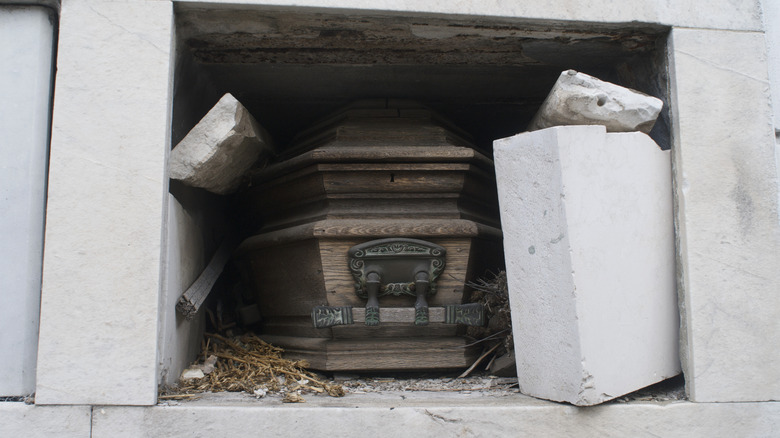The Real Reason A Casket Can Explode
We typically think that once someone is dead and buried in their casket, their time on earth is done. In actuality, when a body is laid to rest, it's still not finished with the natural processes of death. Even though we can no longer see them, our loved ones are doing things we don't want to think about. They are decomposing.
We know this, but in many cases, we try to avoid it. We have them embalmed and put them in expensive boxes that seal airtight in order to try to preserve the body of the person whose lap we used to sit on while they read us stories or whose hand we held for decades as life partners. But try as we might, we cannot win a battle against mother nature.
All organic, biological matter will decompose eventually, and humans are not exempt. So when we are interred in airtight caskets in an effort to keep out water, bugs, oxygen, or any other things that may hasten our decay, it's a valiant effort, but it doesn't work. We are going to rot away regardless, and our off-gasses can also lead to something called "exploding casket syndrome." It's a real thing, and one that funeral directors have to deal with on occasion. It's an unwelcome phenomenon, but Uncle Jim always said he'd go out with a bang.
Exploding caskets are typically found inside of mausoleums
Though the term "exploding casket syndrome" brings to mind dramatic images, in reality, coffins don't always "explode" per se. As funeral director Kari Northey explained on her YouTube channel, pressure from cadaver gasses can build up inside airtight caskets, and since it can't escape, something has to give. While it's possible that a casket can break into pieces from the pressure, or explode, it can also cause smaller incidents, like popping the seam off or breaching the lid. "So there's a little explosion," Northey said. "Whether it's small or big, whose to say?"
The thing with exploding caskets is that we typically may not know when they even happen. If a casket is buried underground, no one would know of any changes for obvious reasons, unless someone exhumes or disinters the body or digs up the grave. The primary place we see so-called exploding caskets is in mausoleums. As The Washington Post explains, mausoleums can get pretty hot since they're aboveground, so the temperature inside of the sealed casket rises as the gasses are looking for an escape, creating something like an Instant Pot effect. When that happens, people can visibly see something is amiss because corpse excrement can leak out and pool on the ground or drip down walls.
Why are corpses so gassy?
Is there even such a thing as a pleasant gas? We can't think of any, but the ones we are about to discuss are extra gnarly, even as bodily gasses go. As our bodies decay after we die, part of the metamorphosis into becoming a skeleton has to do with the anaerobic respiration of bacteria that creates gasses like methane, putrescine, cadaverine, and hydrogen sulfide inside the body, which in turn causes our bodies to inflate. Prior to that, our insides are already liquifying thanks to bacteria and enzymes, so we become a bloated, leaky sack of goo. If we're enclosed in a gasketed casket, meaning the type that seals to be airtight (you can also opt for a non-gasketed design), then as you can likely imagine, the science going on inside of that casket can't-stop-won't-stop. And sometimes, the pressure of all the gas leads to exploding casket syndrome.
According to Kari Northey, when this happens, there are a couple of options. Sometimes, it's just a minor mess that can be "corrected," but if the damage is more severe, a person has to be "re-casketed." And yes, someone has to pay for yet another casket on top of learning about their loved ones' misadventures in their final resting place. However, Northey points out that while "it does happen," exploding caskets aren't "that huge of an issue."


